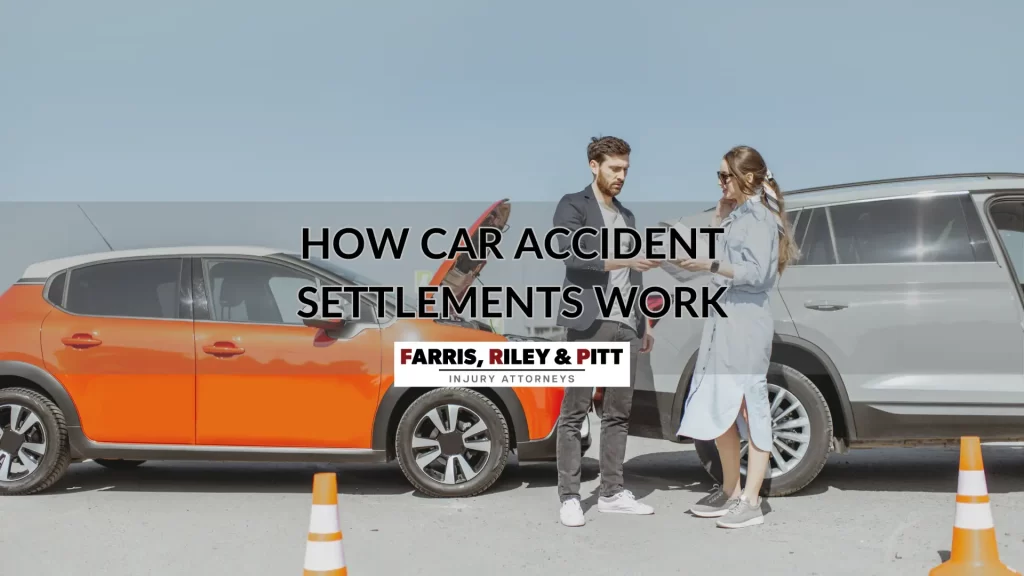Posted on Sunday, March 5th, 2023 at 8:44 am

Car accidents can result in devastating emotional, physical, and financial hardships. After a collision, you should be able to focus on your recovery instead of the financial burden of someone else’s wrongdoing.
To seek compensation from a negligent party in a car collision, you can file a third-party insurance claim with their car insurance company. You should file this claim immediately after a collision. The sooner you file, the sooner you are likely to see your settlement compensation.
Collision Investigation
Your attorney will investigate the collision to confirm who was at fault and determine the value of your claim.
During the initial investigation by your attorney, they may request certain documentation and review a variety of evidence. Some things that your personal injury attorney may do to help establish fault and value are:
- Consult a collision reconstruction
- Consult an expert witness
- Review the police report
- Review and take photos of injuries and the scene
- Get and review witness statements
- Review your medical records
How to File a Car Insurance Claim
To start an insurance claim, you should notify the at-fault driver’s insurance company of the collision. Your attorney will also begin working on a demand letter. A demand letter outlines the dispute and how much compensation you are asking for.
When the insurance company begins the claim process, they will assign an insurance adjuster. The adjuster’s job is to investigate your claim, decide who caused the crash, and negotiate a settlement.
During the adjuster’s investigation, they will likely review the same evidence that your attorney did. They may also request additional evidence or documentation concerning your demand letter claims.
The Settlement Process
Once the insurance adjuster completes their investigation, several things could happen, including:
- They could accept your demand. This is the best outcome because it would result in a settlement agreement for the compensation you requested in your demand letter.
- They could counter your demand request. It is common for an adjuster to counter a demand for a substantial amount of money because they are trying to protect their company’s bottom line. When an adjuster counters your demand, your attorney can start negotiating a fair settlement.
- They could reject your claim. A common reason for rejecting a claim is that the insured was not at fault for the collision. When an adjuster rejects your claim, your attorney might suggest filing a personal injury lawsuit.
Evidence Used to Support Your Claim
If the insurance adjuster counters or rejects your demand, your attorney can use the following evidence to support your claim and negotiate a fair settlement agreement.
- Medical expenses – The amount of medical expenses you have after a car crash depends on the severity of your injuries. When seeking compensation for your past and future medical expenses, you can include the cost of doctor’s visits, surgeries, ongoing treatment, medication, and physical therapy.
- Lost earnings – You shouldn’t have to burn through your vacation time because another person’s negligence prevented you from working. As a result, you can seek compensation for the time you missed from work.
- Reduced earning capacity – If the car crash has substantially affected the amount or type of work you can perform, you can seek reduced earning capacity compensation. You should ask for the difference between your pre-injury and post-injury salary when seeking this compensation.
- Pain and suffering – Being injured is not only physically painful but can also take a mental toll. If you are experiencing physical, emotional, or mental pain and suffering, you can seek compensation for those negative experiences.
How Does Settlement Compensation Get Paid?
 When thinking about settlement money, you may think of a large chunk of cash being handed to you immediately. Unfortunately, that’s not normally the case. When you enter a settlement agreement, it will outline the payment process. Common payment structures for settlements are:
When thinking about settlement money, you may think of a large chunk of cash being handed to you immediately. Unfortunately, that’s not normally the case. When you enter a settlement agreement, it will outline the payment process. Common payment structures for settlements are:
- Lump sum – If you and the other party agree to one payment, it will likely get distributed to your attorney. The timeframe in which it gets sent to your attorney depends on the terms of the agreement. For example, it could be three or 30 days after each party signs the agreement.
- Installment – Sometimes, you might agree to receive installment payments over a specific period. Your settlement agreement should outline the payment amounts and intervals.
Once your attorney receives your settlement compensation, they will deduct certain expenses. These expenses could include:
- Attorneys’ fees – The amount you pay your attorney depends on the arrangement you enter with them. In many cases, a personal injury attorney will charge a contingency fee, meaning they will take a percentage of your settlement as your fee. The percentage is usually around 40 percent but can vary depending on the complexity of your case.
- Outstanding bills – If you have any outstanding medical bills, your attorney will deduct those expenses from your settlement and ensure they get paid.
- Liens on the settlement – When you receive treatment for injuries, your medical provider or health insurance company may place a lien on your settlement. These liens ensure that they get paid or reimbursed. As a result, they must be paid before you receive your settlement amount.
After deducting these expenses, your attorney will give you the remaining settlement compensation.
Contact a Car Accident Attorney for Help Today
At Farris, Riley & Pitt, LLP, our attorneys understand how devastating a car crash can be on your physical, emotional, and mental health. The goal of our car accident attorneys is to provide each person with personalized and high-quality representation. We can listen to your needs and develop a strong strategy to get you the compensation you deserve. Contact us today at (205) 324-1212 or online to discuss your legal options.















